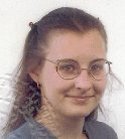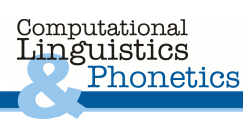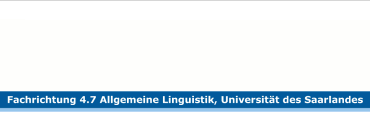Garance PARISAm Geisenberg 36 D-66125 Saarbrücken (Germany) Office: +49 (0)681 302 6553 Home: +49 (0)6897 764307 Born on January 16, 1977, in Uccle, Brussels (47 years old) Citizenship: Belgian, Mother-tongue: French |

|
Education
| Since Sept. 2004 | Graduate studies within the International Research Training Group "Language Technology and Cognitive Systems", Saarland University. Advisor: Prof. Dr. Matthew Crocker. |
| March 2004 | M.Sc. in Language Science and Technology, Saarland University (with honors). Thesis: Lexical Gender and Non-Native Spoken Word-Recognition, Advisor: Dr. Andrea Weber. |
| July 2002 | B.Sc. in Computational Linguistics, Saarland University (1.4). Thesis: Interaction between Tag Set Design and Multilingual Information Extraction, Advisor: Prof. Dr. Elke Teich. |
| October 2000 | ‘Vordiplom’ in Computational Linguistics, Saarland University (1.5). Minor: Translation & machine translation. |
| June 1998 | ‘Candidate's degree’ in Translation (ISTI, Brussels, ‘distinction’, 79 %). Foreign languages: English and German. |
| 1995–1996 | Rotary International Youth Exchange in Hatogaya, Saitama, Japan. |
| 1989–1995 | High School at the ‘Lycée St Jacques’ in Liège, Belgium. Options: German, Math, Latin, Ancient Greek. |
IT skills
| Operating Systems | Mac OS X (daily use), Linux (use, workstation installation and administration), Unix (Solaris, IRIX), Windows (use, installation and administration). |
| Programming languages | Perl (very good knowledge), LATEX (very good), Bash (good), Prolog (good), Mozart Oz (very good, software project FrOZ), Lisp (basics), SML (basics), C and Java (first notions), Praat and SPSS scripting languages. |
| Web Technologies | HTML (good knowledge), PHP (programming of psycholinguistic web experiments), CSS (basics), XML (basics). |
| Applications | Emacs (daily use), MS Word, Excel, Powerpoint, OpenOffice, Gimp, Adobe Illustrator and InDesign. |
Teaching
| 2003–2010 | Lecture Mathematical Foundations of Computational Linguistics III: Statistical Methods. |
| 2006–2011 | Tutorials on symbolic models of parsing and on neural networks for the lecture Computational Psycholinguistics. |
| February 2009 and 2010 | Introductory courses on LATEX for PhD students at Saarland University and for the Friedrich Naumann Foundation. |
| November 2008 | Lectures on the cognitive foundations of language within the M.Sc. course Foundations of Language Science and Technology. |
| February 2002, July 2008 | Introductory courses on LATEX for students of Computational Linguistics (Webpage for the course). |
| May–July '04 | Introductory course on Linux on behalf of the AStA (Student Union of Saarland University). |
| October 2001–2003 | Introductory courses to Unix/Linux for students beginning in Computational Linguistics (with others). |
Languages
(See the Common European Framework of Reference)| French: | mother-tongue |
| English: | near-native, C2 (elementary school from age 6 to 8 in the USA, translation school) |
| German: | fluent, C2 (high school, translation school, university studies in Germany) |
| Dutch: | good, B1 (6th grade in Tongeren, Belgium; Certificate of Dutch as a Foreign Language, 2nd and 3rd levels from 3, 2000) |
| Japanese: | good, A2 (one-year stay in host families and high school attendance; Japanese Language Proficiency Test, level "3-kyu", 1996) |
| Italian: | beginner, A1 |
Work experience
| 2007–2011 | Teaching assistant in the Dept. of Computational Linguistics, Saarland University.
Reference: Prof. Dr. Matthew Crocker. |
| January–March 2008 | Research assistant in the Dept. of Phonetics, Saarland University: Implementation of an online exam in a Learning Management System.
Reference: Prof. Dr. William Barry. |
| March–December 2003 | Student research assistant in the Department of Computational Linguistics (Psycholinguistics), Saarland University: Preparing and running psycholinguistic experiments (mostly eye-tracking).
References: Dr. Andrea Weber, Dr. Alissa Melinger and Prof. Dr. Matthew Crocker. |
| April–December 2002 | Student research assistant in the Department of Applied Linguistics and Translation, Saarland University: Conception and creation of a French-German tagged parallel corpus and programming of a search interface.
Reference: Dr. Andrea Kamm. |
| August–September 2002 | Internship in the Laboratory for Language Analysis and Technology (LATL), Department of Linguistics, University of Geneva, within the European R&D project ‘Freetext’: Testing of the sentence analyzer.
References: Catherine Walther-Green et Anne Vandeventer-Faltin. |
| April–December 2001 | Student research assistant in the Department of Applied Linguistics (English Linguistics and Translation Studies), Saarland University: Search, installation and testing (under Unix, Linux and Windows) of computer software for multilingual corpora.
References: Prof. Dr. Elke Teich et Prof. Dr. Silvia Hansen-Schirra. |
| July–September 2001 | Student research assistant in the Department of Computational Linguistics, Saarland University: Annotation of a German corpus with grammatical relations.
Reference: Dr. Mirella Lapata. |
Publications
(Download)Paris, G., Weber, A. & M. Crocker (in preparation for journal submission) Morphosyntactic gender and lexical competition in non-native listening.
Paris, G., Crocker M. W. & M. R. Mayberry, III (2011) Modeling the effect of lexico-syntactic gender on spoken-word recognition. CogSci 2011, 33rd Annual Meeting of the Cognitive Science Society, Boston (Poster).
Paris, G., & M. W. Crocker (2011) Investigating the transfer of gender categories in L2-learners. ISB8 2011, 8th International Symposium on Bilingualism, Oslo, Norway.
Paris, G., Crocker, M. W. & M. R. Mayberry (2009) Modeling the effect of gender on lexical access. AMLaP 2009, 15th Annual Conference on Architectures and Mechanisms for Language Processing, Barcelona, Spain.
Paris, G., Weber, A. & M. W. Crocker (2009) Using eye tracking to investigate spoken-word tecognition in bilinguals. Eye-to-IT conference on translation processes, Copenhagen, Denmark.
Paris, G. (2009) Modeling gender acquisition and processing in monolinguals and bilinguals. ISB7 2009, 7th International Symposium on Bilingualism, Utrecht, The Netherlands.
Paris, G., Weber, A. & M. W. Crocker (2007) Interference of lexico-syntactic gender in bilingual spoken-word recognition: An eye-tracking study with non-cognate nouns. ISB6 2007, 6th International Symposium on Bilingualism, Hamburg, Germany (Slides).
Paris, G., Weber, A. & M. W. Crocker (2006) German morphosyntactic gender and lexical access. AMLaP 2006, 12th Annual Conference on Architectures and Mechanisms for Language Processing, Nijmegen, The Netherlands (Poster).
Paris, G. & Weber, A. (2005) L1 gender influences lexical competition in L2 listening. Rovereto Workshop on Bilingualism, Rovereto, Italy (Poster).
Paris, G. & Weber, A. (2005) Explaining the gender effect in spoken-word recognition: Evidence of L1 interference during L2 lexical competition. AMLaP 2005, 11th Annual Conference on Architectures and Mechanisms for Language Processing, Gent, Belgium (Poster).
Paris, G. & Weber, A. (2004) The role of gender information in spoken-word recognition in a non-native language. AMLaP 2004, 10th Annual Conference on Architectures and Mechanisms for Language Processing, Aix-en-Provence, France (Slides).
Weber, A. & Paris, G. (2004) The origin of the linguistic gender effect in spoken-word recognition: Evidence from non-native listening. CogSci 2004, 26th Annual Meeting of the Cognitive Science Society, Chicago (Poster).
Participated in: Scheepers, C. (2003). Syntactic priming of relative clause attachments: Persistence of structural configuration in sentence production. Cognition, 89, 179–205.


